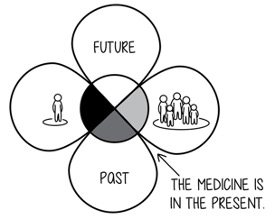
Hi there! I’m Katie Boone, PhD student in Organizational Leadership Policy Development – Evaluation Studies at the University of Minnesota. From our Guiding Principles, Evaluator Competencies, and Statement on Cultural Competence, context has a crucial role in evaluation practice. One of the greatest blindspots I see in the field of evaluation, is our consciousness to place. Valuing the complexity of place in evaluation practice is an opportunity to decolonize the context for our practice.
Decolonizing Context by Working in Place
I’m a settler descendant, connected to a place and story that holds a deep wound (one of thousands) here on Turtle Island. For 23 years, my own journey of reconciling my connection to place has provided me opportunities to learn, heal, and grow from what has been reconciling here for over 51 years, in deep partnership with the Dakota people in this community known as Mankato, Minnesota (Mahkato, Mni Sota), known for being the site of the largest mass execution on U.S. soil. My work has been shaped by these experiences and relationships, guiding my scholarship and studies.
These experiences have shaped my understanding of the impact dis-placement of ancestral homelands has on perpetuating the intergenerational trauma, the ongoing violent colonization, and genocide of Dakota people. The separation of families through the boarding schools and child welfare systems, the implicit bias, and systemic racism of our policies, practices, and programs are all present to this day. I’m learning and unlearning what it means to decolonize my worldview, beliefs, practices and work.
I ask myself: “What could working with place in a decolonizing context look like? What are some tangible ways for evaluators to work with the place and in partnership with First Nations / Indigenous people? How do evaluators critically work with place?”
One way I’ve seen this inform my work with the Dakota and Lakota communities is building consciousness in intercultural settings that explore place, engaging participants in participatory sense-making, and sharing of unwritten elder stories of place and history through a trauma-informed place-making approach. The sense-making process is supported by a Reconciliation Sense-making Framework that Wilfred Keeble and I co-developed (I’m sharing it with his permission).

Wilfred Keeble & Katie Boone, 2019.
This framework helps non-Indigenous participants identify new questions about their own relationship to this place, who they come from and how they got here, how their story integrates into a larger story of this place as it relates to the historical trauma of land theft and colonization, and invites new questions for us to explore together. In the center, the present, all the individual, collective, past and future gets integrated. This is where we find moments of opportunity to explore together the “how” questions that lead us to the next steps of our individual and collective journey towards reconciliation in this place. It is in the present we are best able to work towards actions that move us towards a future that is reconciling our past and co-creating an equitable and just place for future generations to come.
We have found this Reconciliation Sense-making Framework helpful in this reconciling work. The hope in sharing this framework and our rad resources down below, are that these can serve as a helpful resource in supporting evaluators with new insights and learning for working with place in their practice. Together, we hope this will help resource our AEA community of evaluators who are interested in working in a decolonizing context and exploring place in their practice.
Rad Resources
The American Evaluation Association is hosting Decolonization in Evaluation Week with some of our colleagues. Do you have questions, concerns, kudos, or content to extend this AEA365 contribution? Please add them in the comments section for this post on the AEA365 webpage so that we may enrich our community of practice. Would you like to submit an AEA365 Tip? Please send a note of interest to AEA365@eval.org. AEA365 is sponsored by the American Evaluation Association and provides a Tip-a-Day by and for evaluators. The views and opinions expressed on the AEA365 blog are solely those of the original authors and other contributors. These views and opinions do not necessarily represent those of the American Evaluation Association, and/or any/all contributors to this site.
